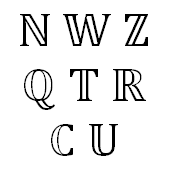Universal Set
If there are some sets under consideration,then there happens to be a set which is a superset of each one of the given sets. Such a set is known as the universal set and it is denoted by 𝕌.
e.g.,
(i) Let A={2,4,6}, B={1,3,5} and C={0,7} Then, 𝕌={0,1,2,3,4,5,6,7} is an universal set.
(ii) For the set of all integers, the universal set can be the set of rational numbers or the set of real numbers.
[Definition] In many discussions all the sets are considered to be subsets of one particular set. This set is called the universal set for that discussion.
| The Universal set is often designated by the script letter 𝕌 (or by 𝕏). Universal set in not unique,and it may change from one discussion to another. |
Example: If P={0,2,7}, Q={3,5,6}, R={1,8,9,10} then the universal set can be taken as the set.
⛲ Question 1. Given the sets S={1,3,5},T={2,4,6} and V={0,2,4,6,8}. Which of the following may be considered as universal set(s) for all three sets S, T, and V?
(i) Ø
(ii) {0,1,2,3,4,5,6,7,8,9,10}
✍ Solution:
We know that, universal set for sets S, T, and V is superset of S, T, and V i.e.,universal set contains all elements of S, T, and V.
(i) Ø cannot be considered as universal set.
(ii) {0,1,2,3,4,5,6,7,8,9,10} is the universal set for the given sets S, T, and V as all the elements of sets S, T, and V are in this set.
⛲ Example 1. Given the sets W={1,3,5}, X={2,4,6} and Y={0,2,4,6,8}, which of the following may be considered as universal set(s) for all the three sets W, X, and Y
(i) {0,1,2,3,4,5,6}
(ii) Ø
(iii) {0,1,2,3,4,5,6,7,8,9,10}
(iv) {1,2,3,4,5,6,7,8}
✍ Solution:
(i) It can be seen that W⊂{0,1,2,3,4,5,6}
X⊂{0,1,2,3,4,5,6}
However,Y⊄{0,1,2,3,4,5,6}
Therefore,the set {0,1,2,3,4,5,6} cannot be the universal set for the sets W, X, and Y.
(ii) W⊄Ø, X⊄Ø, Y⊄Ø
Therefore,Ø cannot be the universal set for the sets W, X, and Y.
(iii) W⊂{0,1,2,3,4,5,6,7,8,9,10}
X⊂{0,1,2,3,4,5,6,7,8,9,10}
Y⊂{0,1,2,3,4,S,6,7,8,9,10}
Therefore,the set {0,1,2,3,4,5,6,7,8,9,10} is the universal set for the sets W, X, and Y.
(iv) W⊂{1,2,3,4,5,6,7,8}
X⊂{1,2,3,4,5,6,7,8}
However, Y⊄{1,2,3,4,5,6,7,8}
Therefore, the set {1,2,3,4,5,6,7,8} cannot be the universal set for the sets W, X, and Y.
Universal Set
Another important set is a universal set.
Definition: Universal Set
A universal set, symbolized by 𝕌, is a set that contains all the elements for any specific discussion.When a universal set is given. only the elements in the universal set may be considered when working the problem. If,for example,the universal set for a particular problem is defined as 𝕌={1,2,3,4,…,10}. then only the natural numbers 1 through 10 may be used in that problem.
⛲ Ex2. Given the universal set={x:x∈ℕ and x<20},find: Z={x:x=3p; p∈ℕ}
✍ Solution:
Universal set 𝕌={x:x∈ℕ and x<20}={1,2,3,4,5,6,7,8,9,10,11,12,13,14,15,16,17,18,19}
Z={x:x=3p; p∈ℕ}
x=3p
If p=1,then x=3⋅1=3
If p=2,then x=3⋅2=6
If p=3,then x=3⋅3=9
If p=4,then x=3⋅4=12
If p=5,then x=3⋅5=15
If p=6,then x=3⋅6=18
∴Z={3,6,9,12,15,18}
🌈 Universal set and Complements


